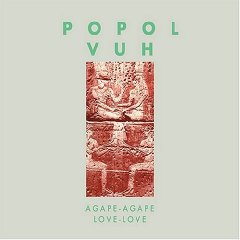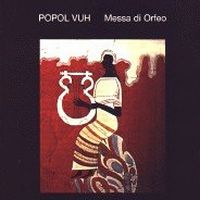Popol Vuh were a German musical collective founded by keyboardist Florian Fricke in 1969 together with Holger Trülzsch (percussion), Frank Fiedler and Bettina Fricke. Other important members during the next two decades included Djong Yun, Renate Knaup, Conny Veit, Daniel Fichelscher, Klaus Wiese and Robert Eliscu. The band took its name from the Mayan manuscript containing the mythology of the Quiché people of highland Guatemala; the name has been translated roughly as "meeting place" or "book of the community".
Daniel "Danny" Secundus Fichelscher,, is a German multi-instrumentalist who played a pivotal role in Krautrock band Popol Vuh, was a member of German group Gila and is currently Amon Düül II's drummer. Fichelscher is the son of jazz pianist and singer Toby Fichelscher.

Florian Fricke was a German musician who started his professional career with electronic music using the Moog synthesizer within the krautrock group Popol Vuh. His music and that of the band however soon evolved in a completely different direction, and he almost completely abandoned synthesizers in favor of the acoustic piano.

Aguirre is the seventh album by German band Popol Vuh. It contains music used in the soundtrack to Werner Herzog's film Aguirre, the Wrath of God (1972), first released as an album in 1975 on Ohr, and reissued in 2004 by SPV with one bonus track. This score was the first of many filmic collaborations between the group and Herzog. Only two tracks are from the film; the rest were gathered from various recordings done by the group during the period 1972–74, including alternative versions of two songs originally released on the band's 1974 album, Einsjäger und Siebenjäger.

Affenstunde is the first album by German band Popol Vuh. Originally released in 1970 in Germany by Liberty Records, it has been reissued several times by various international labels. The 2004 German SPV edition features one previously unreleased bonus track. It is a notable early example of the Moog synthesizer being used for the production and composition of original music.

In den Gärten Pharaos is the second album by German band Popol Vuh, released in 1971 by record label Pilz.

Einsjäger und Siebenjäger is the fifth album by Popol Vuh. It was originally released in 1974 on Kosmische Musik. In 2004 SPV re-released the album with two bonus tracks. "Wo bist Du?" was originally released on Popol Vuh's album Die Nacht der Seele as "Wo bist Du, der Du überwunden hast?".

Das Hohelied Salomos is the sixth album by Popol Vuh. It was originally released in 1975 on United Artists Records. In 2005 SPV re-released the album with three bonus tracks.

Letzte Tage – Letzte Nächte is the eighth album by Popol Vuh. It was originally released in 1976 on United Artists Records. In 2005 SPV re-released the album with three bonus tracks.

Herz aus Glas is the ninth album by Popol Vuh. It was originally released in 1977 on Brain Records. In 2005 SPV re-released the album with two bonus tracks. This album was released as the original motion picture soundtrack of Heart of Glass by German director Werner Herzog, but in fact only two tracks were actually featured in the film.

Nosferatu is the eleventh album by Popol Vuh and was released as the original motion picture soundtrack of Nosferatu: Phantom der Nacht by director Werner Herzog. It was originally released in 1978 on Egg. In 2004 SPV re-released the album with a slightly different track list and adding four tracks originally released on the Popol Vuh album Brüder des Schattens – Söhne des Lichts.

Brüder des Schattens – Söhne des Lichts is the tenth album by Popol Vuh. It was originally released in 1978 on Brain Records. In 2006 SPV re-released the album with one bonus track that was originally released on the remix compilation Sing, for Song Drives Away the Wolves in 1993. The first two tracks from this album were used for the soundtrack of Werner Herzog's film Nosferatu the Vampyre.

Die Nacht der Seele is the twelfth album by Popol Vuh. It was originally released in 1979 on Brain Records. In 2005 SPV re-released the album with four bonus tracks. "Engel der Luft" and "Im Reich der Schatten" were used in 1982 for the soundtrack of Werner Herzog's film Fitzcarraldo.

Sei still, wisse ICH BIN is the thirteenth album by Popol Vuh. It was originally released in 1981 on Klaus Schulze's record label Innovative Communication. In 2006 SPV re-released the album with one bonus track. "Wehe Khorazin", "Garten der Gemeinschaft", an extract of "Laß los" and "... als lebten die Engel auf Erden" were used in 1982 for the soundtrack of Werner Herzog's film Fitzcarraldo.

Agape – Agape / Love – Love is the fourteenth album by Popol Vuh. It was originally released in 1983 on Uniton. In 2004 SPV re-released the album with one bonus track.

Spirit of Peace is the fifteenth album by Popol Vuh. It was originally released in 1985 on Cicada. The first track was used by Werner Herzog as original motion picture soundtrack for his documentary The Dark Glow of the Mountains about Reinhold Messner.

Cobra Verde is the sixteenth album by Popol Vuh. It was originally released in 1987 on Milan Records as the original motion picture soundtrack of Werner Herzog's Cobra Verde with Klaus Kinski. In 2006 SPV re-released the album with one bonus track.

For You and Me is the seventeenth album by Popol Vuh. It was originally released in 1991 on Milan Records. In 2006 SPV re-released the album with one bonus track.

City Raga is the eighteenth album by Popol Vuh. It was originally released in 1995 on Milan Records.

Messa di Orfeo is the twentieth and last album by Popol Vuh. It was originally released in 1999 on Spalax and features music played during an audio-video-light installation as performed in the Labyrinth of Molfetta, Bari, during the Time Zones Festival in 1998.
This page is based on this
Wikipedia article Text is available under the
CC BY-SA 4.0 license; additional terms may apply.
Images, videos and audio are available under their respective licenses.



















